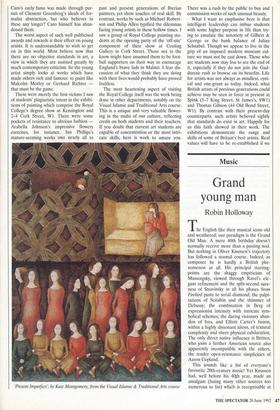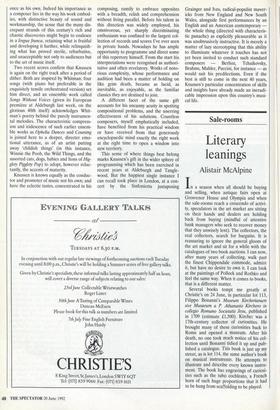M usi c
Grand young man
Robin Holloway
The English like their musical icons old and weathered; our paradigm is the Grand Old Man. A mere 40th birthday doesn't normally receive more than a passing nod. But nothing in Oliver Knussen's trajectory has followed a normal course. Indeed, as composer he is hardly a British phe- nomenon at all. His principal starting- points are the shaggy empiricism of Mussorgsky, viewed through Ravel's ele- gant refinement and the split-second sure- ness of Stravinsky in all his phases from Firebird paste to serial diamond; the palpi- tations of Scriabin and the shimmer of Debussy; the combination in Berg of expressionist intensity with intricate sym- bolical schemes; the daring visionary aban- don of Ives, and Elliott Carter's fusion, within a highly dissonant idiom, of textural complexity and sheer physical exhilaration. The only direct native influence is Britten, who joins a further American source also apparently incompatible with the others, the tender open-resonance simplicities of Aaron Copland.
This sounds like a list of everyone's favourite 20th-century music! Yet Knussen had, well before his 40th year, made an amalgam (fusing many other sources too numerous to list) which is recognisable at once as his own. Indeed his importance as a composer lies in the way his work embod- ies, with distinctive beauty of sound and workmanship, the sense that the many dis- crepant strands of this century's rich and chaotic discoveries might begin to coalesce in a lingua franca, retaining what is fruitful and developing it further, while relinquish- ing what has proved sterile, rebarbative, and unacceptable not only to audiences but to the art of music itself.
Two recent scores confirm that Knussen is again on the right track after a period of dither. Both are inspired by Whitman: four songs (with piano but preferable in the exquisitely tensile orchestrated version) set him direct, and an ensemble work called Songs Without Voices (given its European premiere at Aldeburgh last week, on the glorious 40th itself) acknowledges Whit- man's poetry behind the purely instrumen- tal melodies. The characteristic compress- ion and iridescence of such earlier ensem- ble works as Ophelia Dances and Coursing is joined here to a deeper, directer emo- tional utterance, as of an artist putting away 'childish things' (in this instance, Winnie the Pooh, the Wild Things, and the assorted cats, dogs, babies and lions of Hig- glety Pigglety Pop) to adopt, however reluc- tantly, the accents of maturity.
ICnussen is known equally as the conduc- tor and promoter of music not his own; and here the eclectic tastes, concentrated in his composing, ramify to embrace opposites with a breadth, relish and comprehension without living parallel. Before his talent in this direction was widely employed, his omnivorous, yet sharply discriminating enthusiasm was confined to the largest col- lection of records and scores I've ever seen in private hands. Nowadays he has ample opportunity to programme and direct some of this repertory himself. From the start his interpretations were recognised as authori- tative and often revelatory. Works of noto- rious complexity, whose performance and audition had been a matter of holding on like grim death, became as lucid, as inevitable, as enjoyable, as the familiar classics they are destined to join.
A different facet of the same gift accounts for his uncanny acuity in spotting compositional problems, and the unerring effectiveness of his solutions. Countless composers, myself emphatically included, have benefited from his practical wisdom or have received from that generously encyclopaedic mind exactly the right work at the right time to open a window into new territory.
This sense of where things best belong marks ICnussen's gift in the wider sphere of programming which has been exercised in recent years at Aldeburgh and Tangle- wood. But the happiest single instance I can recall took place in London, at a con- cert by the Sinfonietta juxtaposing
Grainger and Ives, radical-populist maver- icks from New England and New South Wales, alongside first performances by an English and an American contemporary — the whole thing (directed with characteris- tic panache) as explicitly pleasurable as it was unobtrusively instructive. It is merely a matter of lazy stereotyping that this ability to illuminate whatever it touches has not yet been invited to conduct such standard composers — Berlioz, Tchaikovslcy, Brahms, Mahler, Puccini, for instance — as would suit his predilections. Even if the best is still to come in the next 40 years, Knussen's particular concentration of skills and insights have already made an ineradi- cable impression upon this country's musi- cal life.



























































 Previous page
Previous page